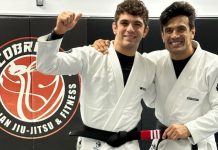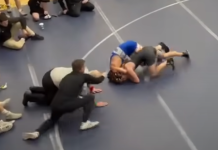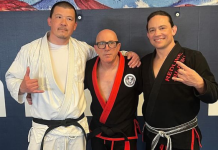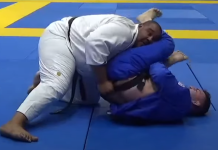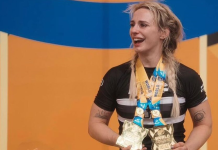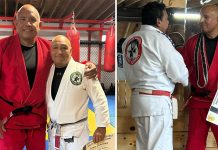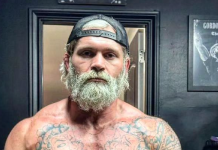Erin Herle has conquered her fair share of high-level jiu-jitsu competition – as well as an amateur MMA victory – but come April, she’s setting her sights on her first pure striking competition: the US Muay Thai Open West in Phoenix. “The thing is, when I did my MMA fight, I felt like I needed to figure out what it felt like to get punched in the face so that I didn’t [rely on] my jiu-jitsu right away,” Herle tells the Jiu-Jitsu Times. “This will obviously be different – because these will be actual strikers who won’t be thinking about anything other than striking.”
Herle may not be the first elite jiu-jitsu black belt to have tried her hand at MMA, but she’s one of the few who’s open about just how non-MMA-friendly her specific grappling style is. “Almost none of my jiu-jitsu really applies to MMA jiu-jitsu,” Herle says, laughing. “In [sport-jiu-jitsu], I’m always on the bottom. In MMA, not only am I supposed to be on top, I’m really supposed to pressure down.”
The decorated Alliance black belt describes herself primarily as a guard specialist – a far cry from the “wrestle-Jitsu” aficionados who typically have an easier time transitioning to MMA, thanks to powerful top game and heavy hands. In contrast, when Herle first expressed an interest in MMA, her declaration sparked immediate alarm from her training partners. “They were like, ‘You’re going to do MMA? Um, you play spider guard, and you haven’t taken anyone down in like twelve years. Why would you do this?’”
The answer? “Because it’s hard,” says Herle bluntly. “Because it’s completely different, and requires a completely different skill set.” Never one to take the easy path forward, Herle constantly seeks self-improvement. “There are so many times that I was so comfortable hitting resistance on a takedown attempt [in jiu-jitsu] and just accepting guard – and I wanted to do something where I couldn’t just rely on that.”
Herle may spend a lot of time pulling guard in pure sport jiu-jitsu, but that didn’t stop her from winning her first MMA fight in 2019 – with a ground and pound knockout, no less.

Unlike many jiu-jitsu players turned MMA fighters – who often take on a few kickboxing matches prior to their first tango in the cage – Herle has never entered a pure striking competition. “When I said, ‘maybe I’ll just do a kickboxing fight first,’ [my coach] told me it would be traumatic,” Herle explains. “He was like, ‘In jiu-jitsu, you can tap out. In kickboxing, you’re going to get hurt no matter what. It’s nonstop. I don’t want to put you in that situation, and make you shy away from it, and be traumatized’ – that was the word he used, ‘trauma.’ And I’m really glad he did.”
In MMA, at least, Herle would have the option of falling back on her grappling skills. “With MMA, if I had chosen to, I could defend, defend, and just look for my shot,” Herle acknowledges. “But this was [an amateur MMA fight], and I wanted to learn what it was like to get punched.”
Now that she’s experienced the thrill and fear of the cage, Herle wants to get truly comfortable with striking – and by eliminating the option of going to the ground, Herle will be forced to exchange blows. It’ll be the first combat sport she’s entered where leveraging superior jiu-jitsu skill simply won’t be an option.
“This tournament is a really easy tournament, in terms of the class I’m entering – there’s class A, class B, class C, and I’m class C, which means zero to three bouts. So basically, that means I’m the novice – like I’m in the equivalent of the white belt division of Muay Thai,” she explains. “I’m obviously going to look at it through the lens of jiu-jitsu, but it’s not jiu-jitsu. It’s going to be a different feel, and I’m looking forward to that, but at the same time, I’m not one of those people who wants to be a Muay Thai champ.”

Taking the pressure off herself is a relief in some ways for an elite black belt – but keeping that pressure off is another matter. “I have literally no pressure on me, but I always put pressure on myself,” she confesses. “Ever since I signed up, I told myself it was going to be fun, but it’s a tournament, and I have all these preconceived notions of what a tournament is.” A bit sheepishly, she adds, “I know my coach would never say this, but I’m like, ‘what if you’re embarrassed by me?’”
Thankfully, her coach – Antoni Hardonk of Dynamix MMA – is good at talking Herle down. When Herle expresses her fears, he gives her the kind of straight talk she needs.
“Is this a career move?” she remembers him asking.
“No,” responded Herle.
“Are you gonna go out there and suddenly have your career depend on this fight?”
“No,” repeated Herle.
“Are you gonna have fun?”
“I hope?” offered Herle timidly.
She grins at this point, as she finishes recounting the no-nonsense exchange. “He’s really good at talking me down off a ledge and adjusting to my anxiety. He knows it always comes from the fear of not being good enough. He wouldn’t put me out there if he didn’t think I was ready to do it.”
According to Herle, Hardonk and her other coaches know that she’s prone to overthinking – so they respond by simplifying things for her. “I can take my competition experience and all the things I’ve learned in jiu-jitsu and apply that to this situation because it’s just a tournament,” Herle adds. “Whether I win or lose, it really doesn’t matter.” After all, flight time is flight time, and what Herle’s looking for, at the end of the day, is a learning experience.
“At first, I was like, I’m not going to tell anyone I’m doing it,” says Herle. She laughs. “Obviously, I changed my mind.”
Not everyone in Herle’s fanbase is thrilled about her seemingly newfound interest in striking. “I would post some striking photos, but people would stop following me, or didn’t like those photos, because they followed me for jiu-jitsu.”
The truth is, there’s nothing actually newfound about Herle’s desire to kickbox – she was simply dissuaded from doing so earlier, thanks to the all-consuming nature of a budding competitive jiu-jitsu career. “I wanted to go into MMA early on,” she says. “I remember telling myself, ‘When I’m a solid purple belt, I’m going to do MMA,’ and it’s like, what the f*** does that mean?” She shakes her head. “Once you get deeper and deeper into the comp scene for jiu-jitsu, you have to spend every waking hour thinking about jiu-jitsu, doing jiu-jitsu, and I came from gyms that would probably literally scoff at me if I said I was doing striking. They’d be like, ‘Aren’t you doing Pans? Aren’t you doing Worlds? Aren’t you doing Abu Dhabi? Then you should probably do the thing you’re competing in.’”
Herle shrugs. “And so I just went full-on, and dedicated myself to jiu-jitsu.”
It wasn’t always the healthiest choice for Herle. “I love training different things because training the same thing over and over again burned me out,” she explains. “And I trained through a lot of that feeling. When I started getting more serious, and I was a purple belt, and I was training full time, I went out there and I lost my first match, and I was suicidal. My mom asked me if I wanted to call a hotline. I did everything, and knowing that it wasn’t enough, putting all your eggs in one basket – I will never do that again.”
Being forced to confront her darker feelings about jiu-jitsu, however, also led to one of Herle’s most rewarding passion projects: her nonprofit organization, Submit the Stigma, which aims to improve mental health awareness in the martial arts community.
“Submit the Stigma was something I had to do,” says Herle. “I had to speak up. I always had – but in an immature way.” She remembers seeking attention – even with something as seemingly inane as posting “emo song lyrics” online – but not having the tools to articulate why she needed that attention. “I needed attention because I was f***ing drowning,” she explains now. With a wry-humored grin, she adds, “But I didn’t have the words. I had emo song lyrics.”
Jiu-jitsu, according to Herle, gave her the confidence to seek out help – which made her wonder why others didn’t. “I started seeing signs of burnout in my training partners – but that’s a badge of honor at some gyms,” says Herle.
It was a thorny issue to tackle. “I’m in a sport and performance psychology program for grad school right now, and basic psychological needs theory for self-determination necessitates competence – the feeling that you’re good at something – autonomy, and relatedness. In jiu-jitsu, you get all three,” explains Herle. While jiu-jitsu can be immensely therapeutic, she acknowledges that the sport also has a way of forcing deeper mental health issues to the surface – particularly in a highly competitive environment.
“Sometimes, you have to be okay with losing,” says Herle. “Sometimes, you have to be okay with not being able to control the outcome.”
That sense of equilibrium has been key for Herle as she works on her striking game – a humbling experience, as a beginner kickboxer, for an athlete who’s competed at the highest levels of another combat sport. She welcomes anonymity, in some ways. “Antoni loves telling my partners they’re going with a jiu-jitsu black belt, but within just the standup, [my jiu-jitsu] isn’t anything at all,” says Herle. “It’s different, it’s completely different. I initially made a lot of mistakes, trying to close in, eating a lot of knees, eating a lot of punches. It’s not forgiving, and people don’t give a s*** where I came from.”

It’s been a steep learning curve. “There’s so much conditioning that goes on in kickboxing,” says Herle. “I saw my body change. My feet have gotten some muscle – because when I kick, not only do I have to hop on one foot, I also have to rotate, and do these precise movements.”
Her body has also taken a thorough beating as a result of that conditioning. Laughing, Herle exclaims, “Dude, I went and I kicked a bag, and my shin got so bruised – because normally we wear shin pads in training – I was like, ‘man, I’ve got p**sy shins. This is dumb! My legs are dumb!’”
And then there’s the matter of the warmup. “Ten o’clock in the morning, I wake up by having someone punch me in the face, which is way different from jiu-jitsu – there are literally things flying at your face. And it’s not your partner’s fault if you don’t check or slip in time! So you build up the timing. And it’s so, so tiring. It’s a different type of cardio from jiu-jitsu.”
She also had to undo certain habits specific to her own jiu-jitsu style. “I was a guard puller, spider-guard player, gi player, so I had to learn to adapt my grips and find those angles,” explains Herle. “And footwork. Footwork is huge. I had no footwork in jiu-jitsu. In striking, I really have to either be in striking range or be outside and able to shadow them. That’s really hard – it’s probably the hardest thing about striking for me, having that instinct and that timing.”
Perhaps unsurprisingly, however, Herle excels in the clinch, which is the closest she gets to using her jiu-jitsu. “Being able to react to what the person is doing, with frames, and being very responsive to what your partner is doing – I feel like it’s jiu-jitsu on the feet,” she says.
Still, she has no illusions about the dangers unique to a striking-specific sport: “Even though for this tournament, we’re wearing protective gear, these girls are going to come at me. There are immediate consequences – and when you lose focus, it’s devastating. It’s hard to just stay in it. I call it my Spidey senses – those are way more important in a striking environment than a jiu-jitsu one.”
One big fan of Herle’s budding striking career is her friend Shane Fazen of Fight Tips fame. Herle – who previously appeared on the Fight Tips YouTube channel demonstrating a playful live roll with then white belt Fazen – has confirmed that she’ll be teaming up with the Fight Tips team once more for an upcoming seminar. “I truly believe that what [Fazen] is doing is super important,” says Herle. “I love that he’s not about competition – he’s a great competitor, but people don’t judge him on his ability to fight, they judge him on his ability to teach.”
Teaching is also a major passion of Herle’s. As both a jiu-jitsu professor and mental health advocate, she truly loves coaxing greatness out of her fellow athletes. “What you need is already inside you,” she firmly believes. “You just need someone else to help bring it out.”
While she may not be terribly keen on turning pro in a second combat sport, she believes that training – and competing – as a kickboxer and MMA fighter will reap benefits for her career goals off the mats. Herle is currently working toward her certification as a mental performance consultant through the Association of Applied Sports Psychology. “Once you get your master’s, you go through a mentorship, and then you take an exam, and then there’s continuing education,” says Herle. “It’s a certification, similar to an EMT, but on a higher level. There’s a lot of freedom – you can work with athletes, with dancers, with anyone who has to do something physically and emotionally taxing.”
Herle’s aim is to specialize in working with combat athletes – which, for her, means developing better insight into MMA and striking sports from a competitor’s perspective.
As a female athlete in a male-dominated sport, Herle has also been motivated to develop a stronger understanding of gender politics on the mat. “I just did a literature review – it was ‘Mindfulness As a Mediator for Mental Toughness for Female Combat Sport Athletes,’ so I read a lot. There’s one called ‘Pink Gloves Still Give Black Eyes.’ First of all, there’s a baseline, there’s a group of selective traits that are already within women who find combat sports and seek out combat sports. They’re non-conformists. They don’t believe as much in gender roles. For [those] women, they seek out masculine qualities because those are literally required to excel at these sports.”

In short? “By stepping into a combat sports gym, you are automatically putting yourself out there as questioning your femininity,” explains Herle. As a result, female combat sports athletes often “protect their femininity” – whether with braids, pink gloves, or Muay Thai skirts.
For Herle, it all boils down to the right for an athlete – of any gender – to express authenticity. “I want to be in a space where I don’t have to put on a mask,” she says. “And I’m trying to make sure that people can feel comfortable being authentic.”
Authenticity, after all, is also one of the major tenets of Submit the Stigma. Beyond any physical victory – whether in the ring, the cage, or on the mat – growing a better environment for empathy, inclusion, and healthy authenticity in combat sports is Herle’s true aim: “The more open you are, the more open others are.”
And that trickle-down effect, at the end of the day, is what pays dividends within the culture of a gym – and the mental health of its athletes.
To support Submit the Stigma, check out the website to learn about ways to help.
To stay up to date on Erin Herle’s upcoming events and projects, follow her on Instagram.





